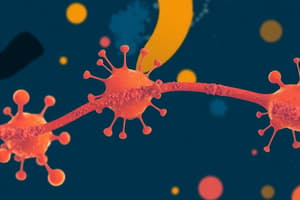Podcast
Questions and Answers
Which neoplastic disorders can be treated with cyclophosphamide?
Which neoplastic disorders can be treated with cyclophosphamide?
- Lymphomas (correct)
- Hepatitis C
- Acute lymphoblastic leukemia (correct)
- Chronic granulomatous diseases
What adverse effect is associated with cyclophosphamide and is categorized as teratogenic?
What adverse effect is associated with cyclophosphamide and is categorized as teratogenic?
Pulmonary fibrosis
Antilymphocyte globulins and Antithymocyte globulins are examples of ________ antibodies.
Antilymphocyte globulins and Antithymocyte globulins are examples of ________ antibodies.
polyclonal
Polyclonal antibodies are less specific compared to monoclonal antibodies.
Polyclonal antibodies are less specific compared to monoclonal antibodies.
Match the following antibodies with their mechanism of action:
Match the following antibodies with their mechanism of action:
What are the two main arms of the immune system?
What are the two main arms of the immune system?
What is the mechanism of action of Cyclosporine?
What is the mechanism of action of Cyclosporine?
Tacrolimus is chemically related to Cyclosporine.
Tacrolimus is chemically related to Cyclosporine.
_____ is an antimetabolite that inhibits purine or pyrimidine synthesis.
_____ is an antimetabolite that inhibits purine or pyrimidine synthesis.
Match the immunosuppressant drugs with their mechanisms of action:
Match the immunosuppressant drugs with their mechanisms of action:
Flashcards are hidden until you start studying
Study Notes
Immune System
- Designed to protect the host from harmful foreign molecules, but can result in serious problems
- Two main arms: cell-mediated immunity and humoral (antibody-mediated) immunity
Cell-Mediated Immunity
- Involves ingestion and digestion of antigens by antigen-presenting cells
- Activated TH cells secrete IL-2, which stimulates TH1 and TH2 cells
- TH1 cells produce TNF-β and IFN-γ, which activate:
- NK cells (kill tumor and virus-infected cells)
- Cytotoxic T cells (kill tumor and virus-infected cells)
- Macrophages (kill bacteria)
Humoral Immunity
- B-lymphocytes bind to antigens and are induced by IL-4 and IL-5 produced by TH2 cells
- Results in B-cell proliferation and differentiation into:
- Memory cells
- Antibody-secreting plasma cells
Mutual Regulation of T Helper Lymphocytes
- TH1 cells produce interferon-γ, which inhibits TH2 cell proliferation
- TH2 cells produce IL-10, which inhibits TH1 cytokine production
Cytokines
- Soluble, antigen-nonspecific signaling proteins that bind to cell surface receptors
- Include:
- Interleukins (IL-1, IL-2, etc.)
- Interferons (IFN-α, IFN-β, etc.)
- Tumor Necrosis Factors (TNF-α, etc.)
- Transforming Growth Factors (TGF-α, etc.)
- Colony-stimulating factors (CSFs)
Immunosuppressant Drugs
- Inhibitors of cytokine production or action:
- Calcineurin inhibitors (cyclosporine, tacrolimus)
- Sirolimus (rapamycin)
- Inhibitors of cytokine gene expression:
- Corticosteroids
- Cytotoxic drugs:
- Inhibitors of purine or pyrimidine synthesis (antimetabolites: mycophenolate mofetil, azathioprine, etc.)
- Alkylating agents (cyclophosphamide)
- Immunosuppressive antibodies:
- Antilymphocyte globulins (ALG)
- Antithymocyte globulins (ATG)
- Monoclonal antibodies (muromonab-CD3, basiliximab, daclizumab)
Cyclosporine
- Fungal polypeptide composed of 11 amino acids
- Mechanism of action: inhibits interleukin-2 production, decreases T cell proliferation and differentiation
- Pharmacokinetics: oral or i.v. administration, variable absorption, peak levels in 1-4 hours
- Uses: organ transplantation, autoimmune disorders, graft-versus-host disease
Adverse Effects of Cyclosporine
- Nephrotoxicity
- Hypertension
- Liver dysfunction
- Hyperglycemia
- Viral infections
- Lymphoma
- Hirsutism
- Neurotoxicity
- Gum hyperplasia
Tacrolimus (FK506)
- Macrolide antibiotic produced by bacteria
- Mechanism of action: inhibits calcineurin, decreasing T cell proliferation and differentiation
- Pharmacokinetics: oral or i.v. administration, variable absorption, peak levels in 9-12 hours
- Uses: organ transplantation, atopic dermatitis, psoriasis
Adverse Effects of Tacrolimus
- Nephrotoxicity
- Neurotoxicity
- Hyperglycemia
- GIT disturbances
- Hypertension
- Anaphylaxis
Sirolimus (Rapamycin)
- Macrolide antibiotic
- Mechanism of action: inhibits response to IL-2, blocking T cell and B cell proliferation
- Pharmacokinetics: oral administration, reduced by fat meal, extensively bound to plasma proteins
- Uses: solid organ allografts, hematopoietic stem cell transplantation
Adverse Effects of Sirolimus
- Hyperlipidemia
- Thrombocytopenia
- Leukopenia
- Hepatotoxicity
- Hypertension
- GIT dysfunction
Corticosteroids
- Mechanism of action: anti-inflammatory and immunosuppressant effects
- Kinetics: oral, parenteral, topical, or inhalational administration
- Uses: solid organ allografts, autoimmune disorders, acute or chronic rejection
Adverse Effects of Corticosteroids
- Adrenal suppression
- Osteoporosis
- Hypercholesterolemia
- Hyperglycemia
- Hypertension
- Cataract
- Infection
Azathioprine
- Antimetabolite immunosuppressant
- Mechanism of action: inhibits de novo synthesis of purines
- Pharmacokinetics: oral or i.v. administration, metabolized in the liver
- Uses: autoimmune disorders, acute glomerulonephritis, Crohn's disease
Adverse Effects of Azathioprine
- Bone marrow depression
- Gastrointestinal toxicity
- Hepatic dysfunction
- Increased risk of infections
- Leukopenia
- Thrombocytopenia
Mycophenolate Mofetil
- Antimetabolite immunosuppressant
- Mechanism of action: inhibits de novo synthesis of purines
- Pharmacokinetics: oral or i.v. administration, metabolized in the liver
- Uses: solid organ transplantation, autoimmune disorders
Adverse Effects of Mycophenolate Mofetil
- GIT toxicity
- Leukopenia
- Lymphoma
Leflunomide
- Antimetabolite immunosuppressant
- Mechanism of action: inhibits pyrimidine synthesis
- Pharmacokinetics: oral administration, active metabolite undergoes enterohepatic circulation
- Uses: rheumatoid arthritis
Adverse Effects of Leflunomide
- Elevation of liver enzymes
- Renal impairment
- Teratogenicity
- Cardiovascular effects
Methotrexate
- Antimetabolite immunosuppressant
- Mechanism of action: inhibits dihydrofolate reductase
- Pharmacokinetics: oral or parenteral administration
- Uses: autoimmune disorders, cancer
Adverse Effects of Methotrexate
- Pulmonary fibrosis
- Nausea, vomiting, diarrhea
- Alopecia
- Bone marrow depression
- Teratogenicity
Cyclophosphamide
- Alkylating agent
- Mechanism of action: destroys proliferating lymphoid cells
- Pharmacokinetics: oral or i.v. administration
- Uses: autoimmune disorders, cancer
Adverse Effects of Cyclophosphamide
- Alopecia
- Hemorrhagic cystitis
- Bone marrow suppression
- GIT disorders
- Sterility
Antibodies
- Polyclonal antibodies: anti-lymphocyte globulins (ALG), anti-thymocyte globulins (ATG)
- Monoclonal antibodies: muromonab-CD3, basiliximab, daclizumab
Muromonab-CD3
- Mechanism of action: binds to CD3 proteins on T lymphocytes, disrupting T-lymphocyte function
- Uses: treatment of acute renal allograft rejection, steroid-resistant acute allograft rejection
Adverse Effects of Muromonab-CD3
- Anaphylactic reactions
- Fever
- CNS effects
- Infection
- Cytokine release syndrome
Basiliximab and Daclizumab
- Mechanism of action: bind to CD25 (α-subunit chain of IL-2 receptor on activated lymphocytes), blocking IL-2-stimulated T cell replication
- Uses: prophylaxis of acute organ rejection in renal transplantation
Adverse Effects of Basiliximab and Daclizumab
- Well tolerated, only GIT disorders reported
Studying That Suits You
Use AI to generate personalized quizzes and flashcards to suit your learning preferences.




